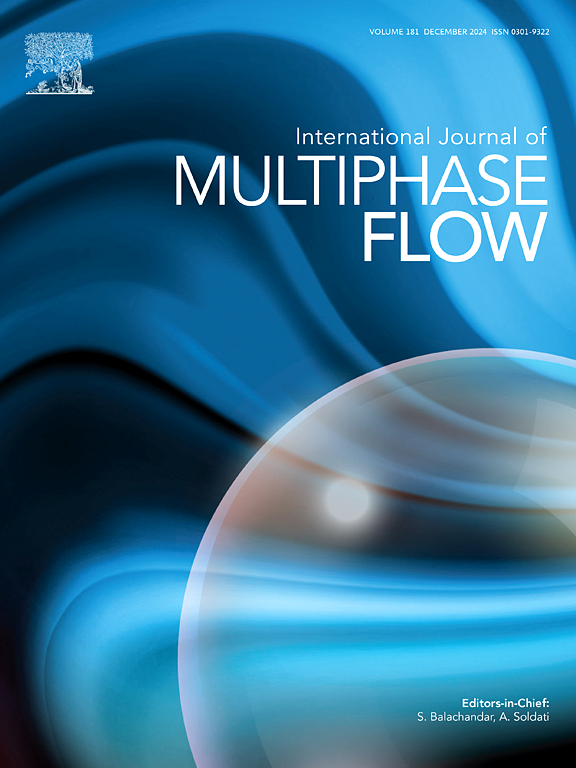Investigation on flow characteristics of highly viscous oil-water core-annular flow in horizontal pipes based on machine learning
IF 3.6
2区 工程技术
Q1 MECHANICS
International Journal of Multiphase Flow
Pub Date : 2025-04-18
DOI:10.1016/j.ijmultiphaseflow.2025.105265
引用次数: 0
Abstract
Water-annulus technology is regarded as a promising and efficient method for reducing drag and saving power in the transportation of highly viscous oil. Most existing theoretical prediction models for high-viscosity oil-water core-annular flow in horizontal pipes are based on a concentric core-annular flow configuration with a circular oil core and a smooth oil-water interface. In reality, however, this ideal configuration may not be achieved due to the buoyant force resulting from the density difference between the oil and water, and the instability of the interface. This discrepancy leads to a significant deviation between predicted results and experimental values for flow characteristics, particularly the pressure gradient and water holdup. Therefore, this study proposes a back propagation neural network model enhanced by particle swarm optimization to predict these flow characteristics for highly viscous oil-water core-annular flow in horizontal pipes. The model is trained and tested using experimental data obtained in experimental studies reported in the literature. The results indicate that the new model achieves high prediction accuracy for both pressure gradients and water holdups, significantly surpassing the accuracy of existing phenomenological models for core-annular flow. This proposed modeling approach has the potential to be a powerful tool for design and flow optimization in the petroleum industry.

基于机器学习的水平管道中高粘度油水芯环形流的流动特性研究
水环空技术被认为是一种很有前途的高效的降低高粘油输送阻力、节约动力的方法。现有的水平管内高黏度油水岩心环空流动理论预测模型大多是基于圆形油心和光滑油水界面的同心岩心环空流动结构。然而,在现实中,由于油和水之间的密度差产生的浮力以及界面的不稳定性,这种理想的配置可能无法实现。这种差异导致流动特性的预测结果与实验值之间存在显著偏差,特别是压力梯度和持水率。因此,本研究提出了一种基于粒子群优化的反向传播神经网络模型来预测水平管道中高粘性油水岩心环空流动的流动特性。该模型使用文献中报道的实验研究中获得的实验数据进行训练和测试。结果表明,该模型对压力梯度和持水量均具有较高的预测精度,显著优于现有的岩心-环空流动现象学模型的预测精度。这种建模方法有可能成为石油工业设计和流程优化的有力工具。
本文章由计算机程序翻译,如有差异,请以英文原文为准。
求助全文
约1分钟内获得全文
求助全文
来源期刊
CiteScore
7.30
自引率
10.50%
发文量
244
审稿时长
4 months
期刊介绍:
The International Journal of Multiphase Flow publishes analytical, numerical and experimental articles of lasting interest. The scope of the journal includes all aspects of mass, momentum and energy exchange phenomena among different phases such as occur in disperse flows, gas–liquid and liquid–liquid flows, flows in porous media, boiling, granular flows and others.
The journal publishes full papers, brief communications and conference announcements.

 求助内容:
求助内容: 应助结果提醒方式:
应助结果提醒方式:


